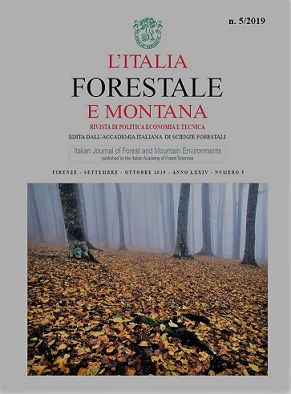Published
2019-11-06
Keywords
- silviculture; human,
- forest and environmental interests
Abstract
When living through radical adjustments, in particular during the change of an era, modifications in the objectives of human actions take place. The modern age is characterized by the technical dominance over nature, in the sphere of an absolute conception, “sacred” to man and relative, material, geometric and mechanical to nature. All of this has historically created the magnitude of the ecological crisis, with the enormous phenomenon of climate change and the loss of biodiversity. This picture directly impacts the conception and the role of the forests, making them important and of universal and historic interest. The safeguard of the forests must derive from the reconsidered relationship between man and nature, thereby aiming towards the definition of new values and new rights, in a position to associate the interest of the forest and the environment with human interest. In short this implies introducing forestry science to culture so that the culture itself extends to forestry science, thereby transforming silvi-cultivation into silvi-culture


